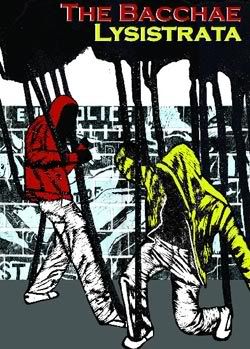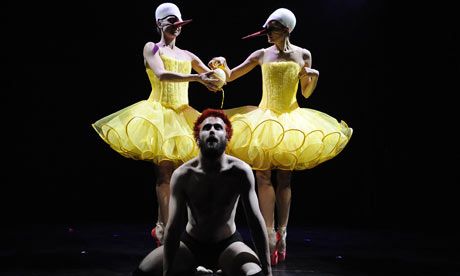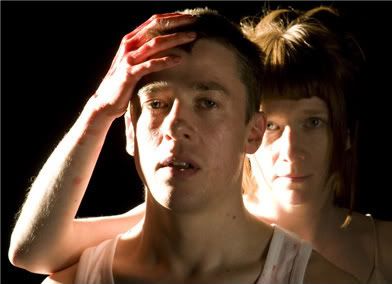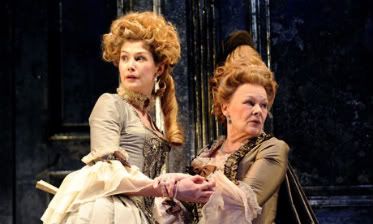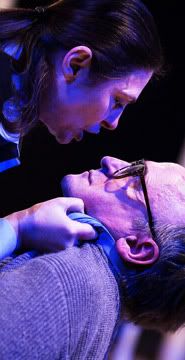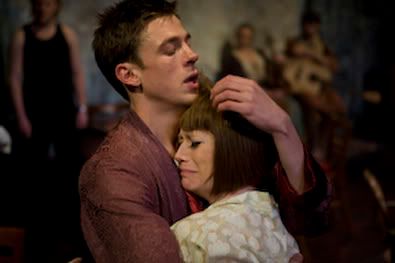
The Thin Line Between
By Phil Burt
Ordinarily, madness is not a thing to be shouted about. While its a far cry from days gone by with the tendency to lock someone up and throw away the key at even a hint of a crazed expression, its still not something to rejoice clearly seen recently with the over exaggerated fear of mind altering diseases such as foot and mouth and swine flu. But, as always, the same rules don't apply to the theatre. From last year's
Hysteria by visiting Brazilian company Grupo XIX de Teatro, to the recent National theatre pairing of Felix Barrett and Tom Morris with
Every Good Boy Deserves Favour, it would appear that madness is the
topic de jour. So, have fledging group Love & Madness, who are about to begin their first residency season at Hammersmith's Riverside Studios, simply jumped on the insanity bandwagon? "To be honest, I don't know exactly where the name came from" muses group founder and artistic director Neil Sheppeck "If I really thought about it, its probably because both love and madness are the ingredients of passion, which is the driving force behind all good creative work. So it feels right that it's our name. Plus, only few people get into acting for money or because its just another job - to want to do it there has to be a great love and part of you that's slightly crazy"
The group had a beginning of sorts back in 2000 when Sheppeck, a jobbing actor at the time, would continually discuss his ideas for staging
Macbeth "Barrie Rutter (founder of Northern Broadsides) turned round to me and said "Stop talking about it and just do it"....I had a couple of months free so I thought, lets give it a go" Sheppeck did just this first hiring the basement of Earls Court's Finborough Theatre, a space never before used for performance, and then taking the production up to the 2001 Edinburgh festival where it did "amazingly well". It was only after a successful second Shakespeare piece, this time
Othello, that Neil decided to formalise the company under the title they use today. The last six or so years has seen the group tour the UK and Ireland extensively, reworking and revitalising classics while also developing new work, all in an attempt to make good, clear theatre. "We were very based on classical work to start off with, and making that contemporary - which we still try to do - but we've also started doing more recent work and a lot more modern writing. We've actually gone from what was initially classical prose that we were interested in, to just wanting to perform theatre well".
While the period plays are retrieved from may have changed, one thing that has remained integral to the group from day one is the importance of the ensemble, an element that sets them apart from other British companies and attracts a number of well-known followers. Theatre veteran Jack Shepherd has had a close alliance with Love & Madness since early 2007 when he directed
The Tempest and became what Sheppeck terms "an unofficial mentor". It would appear the emphasis on the quality of work rather than a desire to acquire fame and fortune is what drew Shepherd to this company of actors, as well as the intimate, personal bonds that had already been established "I think a family has been developed coming from working with the same people over and over again. People within the industry are quite cut throat and don't open up very easily, and don't necessarily come across as very genuine people. We find that anyone who works with us who has any kind of pretension either learns to lose that very quickly, or they don't work with us again. That attitude doesn't make for a good ensemble, which is ultimately people who trust each other and get on to do creative work...and I think that's something that attracted Jack"
The upcoming season at the Riverside sees Love & Madness come full circle as they begin the run with the production that started the whole thing off -
Macbeth. Joining the Scottish play on the bill is Sophocles'
Ajax, directed by Shepherd, and
A Skull in Connemara, by Martin McDonagh, which will bring the whole season into the 21st century. Rounding off the residency is the positively tantalising piece that is, for the moment at least, referred to only as
Project X. Sheppeck has set his actors the task of devising this production while rehearsing and performing the other three and, through using these as starting points alongside day to day events taking place in the world outside the theatre, there is the potential to create something entirely unique that can take on any shape or form. "Within a season where we're doing Greek work from thousands of years ago, Shakespeare from hundreds of years ago and McDonagh of over a decade ago, to do the final piece that is inspired by 'the now', I don't see how it can be more contemporary." But while the lack of rules and restrictions may be a scary prospect for some directors, Sheppeck refuses to be worried "When you're working with amazing text by Sophocles and Shakespeare, where the language is so rich and so important... to be inspired by these you're not going to end up with some naff soap opera. If you're spending five weeks constantly working on great, great pieces of writing you cannot help but be influences by them - so watch this space!"
And so, what can we expect from the group after the doors of the Riverside close on July 26th? "I love the idea of taking it further you know. We've done lots of work in the UK and Ireland but it would be great to go further to Europe or elsewhere. Our ambition doesn't seem to end.....there's all sorts we can do." Looks like we better start preparing ourselves for a worldwide epidemic.
The Madness Season will be running at Riverside Studios until July 26th. The following productions will be in rep from these dates:
Macbeth - May 20th to July 26th
Ajax - May 26th to July 25th
A Skull in Connemara - July 16th to July 26th
Project X - June 30th to July 25th
For more information visit the Love & Madness website
HERE or jump straight to the Riverside Studios
HERE


